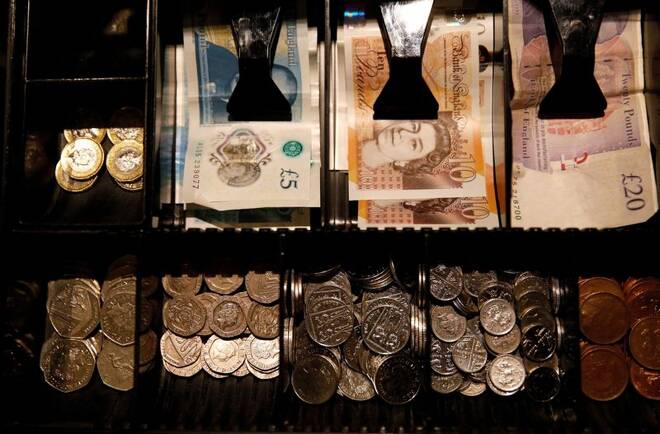Advertisement
Advertisement
Sterling edges back to near six-month peak, all eyes on rate outlook
By:
By Samuel Indyk LONDON (Reuters) - The pound edged higher against the dollar on Wednesday and traded near its highest level in almost six months, as policymakers enter the quiet period ahead of crucial Bank of England, Federal Reserve and European Central Bank meetings.
By Samuel Indyk
LONDON (Reuters) – The pound edged higher against the dollar on Wednesday and traded near its highest level in almost six months, as policymakers enter the quiet period ahead of crucial Bank of England, Federal Reserve and European Central Bank meetings.
By 1111 GMT, the pound was up 0.3% against the dollar to $1.2170. It hit a near six-month high of $1.2345 on Monday.
Against the euro, the pound was up 0.1% at 86.16 pence.
After hitting a record low of $1.0327 in late September, sterling has risen almost 18%, as the new government reversed most of the previous administration’s mini-budget and the dollar eased as the Federal Reserve looks to slow the pace of rate hikes.
The Fed, the Bank of England (BoE) and European Central Bank (ECB) will next week set interest rates, with central bankers set to enter their quiet period before the meetings.
“The BoE is expected to continue pushing back against market pricing of UK interest rates, which could weigh on sterling,” said George Vessey, UK currency strategist at Western Union Business Solutions.
The BoE has raised rates from 0.1% to 3.0% in the current tightening cycle and markets are pricing in a peak in interest rates at around 4.6% next year, but officials have consistently pushed back on expectations for the terminal rate.
BoE Governor Andrew Bailey told a news conference after the most recent interest rate decision the bank rate will likely rise by less than what financial markets expected.
BoE rate-setter Swati Dhingra said in an interview published on Saturday that higher interest rates could lead to a deeper and longer recession.
A poll of economists expects the BoE to opt for a 50 basis point rate rise next Thursday, down from 75 basis points at the November meeting.
Meanwhile, Halifax said house prices declined 2.3% month-on-month in November, the largest fall since October 2008, as the economic turmoil caused by former prime minister Liz Truss’s government had a notable effect on the housing market.
“We are coming off the back of heightened property price inflation, with those upward pressures finally starting to ease as a result of rising mortgage rates, a looming recession and the cost-of-living crisis,” said Victoria Scholar, head of investment at interactive investor.
“The chaos around the mini-budget which sent mortgage rates soaring has also put off potential buyers,” Scholar said.
(Reporting by Samuel Indyk; Editing by Arun Koyyur)
About the Author
Reuterscontributor
Reuters, the news and media division of Thomson Reuters, is the world’s largest international multimedia news provider reaching more than one billion people every day. Reuters provides trusted business, financial, national, and international news to professionals via Thomson Reuters desktops, the world's media organizations, and directly to consumers at Reuters.com and via Reuters TV. Learn more about Thomson Reuters products:
Did you find this article useful?
Latest news and analysis
Advertisement
